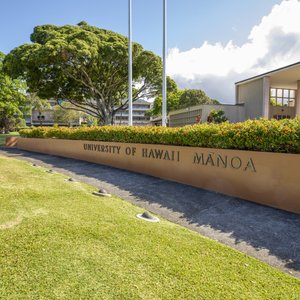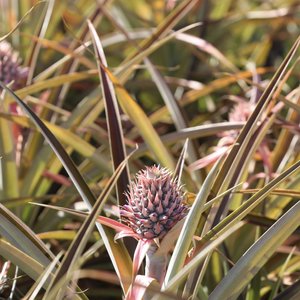Innovation is happening all around us in Hawaii. For Pacific Business News’ local Inno coverage, we keep an eye on traditional tech startups as well as entrepreneurs in the energy and food independence sectors.
Here are nine innovative businesses to watch, based on our past reporting, tips from industry observers and a look at what companies have been earning recognition in the startup ecosystem. Each on a path to success, with this initial roundup, we wanted to convey the range of creative ventures underway right now.
MALAMA SOLAR
Energy
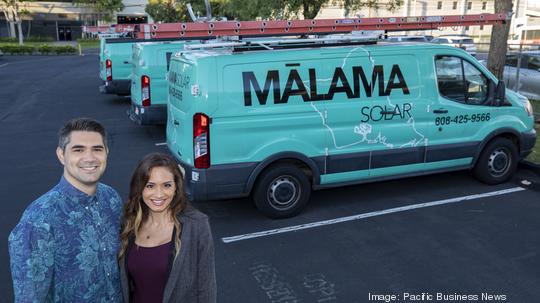
Malama Solar is a company to watch as it continues to expand its residential photovoltaic panel and battery storage business – in already record time and in a large field of providers on Oahu – to include service to Hawaii Island and Maui by the end of 2022.
Husband-wife team and co-owners, Chris and Rachel Ah Sue, have also set out to reclaim their spot at the top of PBN’s Fastest Growing Companies list, which for 2022, will be ranked by revenue growth from 2019 to 2021.
Rachel Ah Sue told PBN that to keep the momentum going, they plan to bring its same concept to the Neighbor Islands, while remaining headquartered on Oahu. She’s already begun training new and existing leadership with plans to hire double the sales staff by Q1. “We wanted to start a company whose core values reflected that of our own – an organization that we would be proud of because of what it stands for,” she said.
In 2018, the pair pulled from their savings and played to their strengths in sales and organizational structure to build the start-up slowly, focusing on just a few customers at a time, and getting the foundation down first, before growing.
“It is always tempting to just go for the low-hanging fruit, to get as much business as you can; but without a solid foundation, you’ll fall a lot more, and potentially lose trust from others along the way,” Rachel said.
Another mark of growth has been its adoption of technology. The company’s recent installations feature new products able to increase battery storage and better monitoring systems, among other efficiencies.
Looking ahead, Rachel is most excited to introduce local community events around sustainability and attend the annual Solar Power International conference to integrate into Hawaii’s solar energy offerings.
WAIWAI COLLECTIVE
Social enterprise/Coworking hub
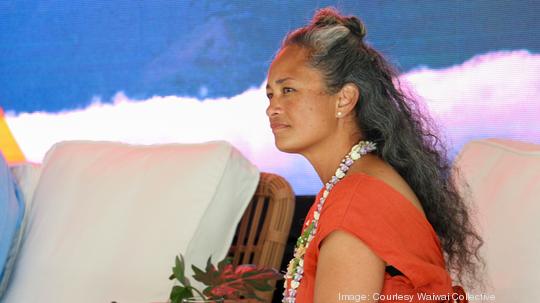
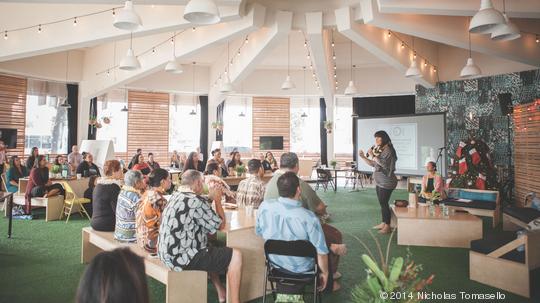
As businesses continue to adopt hybrid work as the ‘new normal’, Waiwai Collective and other local coworking spaces are reimagining the workplace model. Mahina Paishon-Duarte, co-founder and CEO, said that the social impact enterprise, founded in 2017, is “unique in that we design and curate spaces that intentionally foster Hawaii ancestral values that help our local organizations reflect on how we lead, how we interact, how we treat our natural environments; and how we lean into shared kuleana. Finding ways to intersect with culture, community, and commerce is what we do.”
In 2022, Waiwai Collective plans to open its third site in Waimea on Hawaii Island, adding to its two-location portfolio in Honolulu, while exploring a hybrid cooperative ownership model, Paishon-Duarte said. It is funded by individual coworking and corporate memberships, space rentals, contract agreements for professional services, and grants to help Hawaii find solutions to critical issues through shared ancestral values, she added.
“The old extractive profit maximization at all cost harms our aina, our social coherence, and sense of shared kuleana,” Paishon-Duarte said. “Hawaii needs to innovate towards new business models, strategies and economies that are equity and whole systems centered. The health and vitality of our waters, oceans, mountains, forests and precious heritage is at stake. We are proud of the transparent policies that we have created to help us maintain our priorities to support local food production, local and Native Hawaiian makers.”
SMART YIELDS
Agriculture

Founded in 2015, making it one of Hawaii’s more established startups, Smart Yields is an agricultural technology firm that combines real-time monitoring, data analytics, and digital agronomy for agricultural use into a mobile app designed for use in the field.
At the beginning of the year, Ryan Ozawa, who has been with the company since its inception, was named CEO. In a recent interview with PBN he said that Smart Yields has big plans for the new year. The ag tech firm gets most of its financial support from grants, contracts and other non-dilutive funding.
“I would say that my priority right now is to support and sustain our current project, the main one being an app called ‘Best Beans,’ which we are developing with the United States Department of Agriculture,” Ozawa said. “The app is a form of integrated pest management that helps farmers track, report and find help with coffee berry borers, an insect that is affecting coffee crops on Hawaii Island and elsewhere.”
Ozawa also said that amid the Covid-19 pandemic’s increasingly virtual climate, farmers have been more willing to adopt technology like what Smart Yields provides, increasing the company’s engagement with Hawaii’s ag community.
“I think the overall shift to remote operations has made everyone, and certainly farmers more comfortable with remote solutions,” Ozawa said. “Farmers are becoming more welcoming of tech as it becomes more mainstream.”
FARM LINK HAWAII
Agriculture, E-commerce
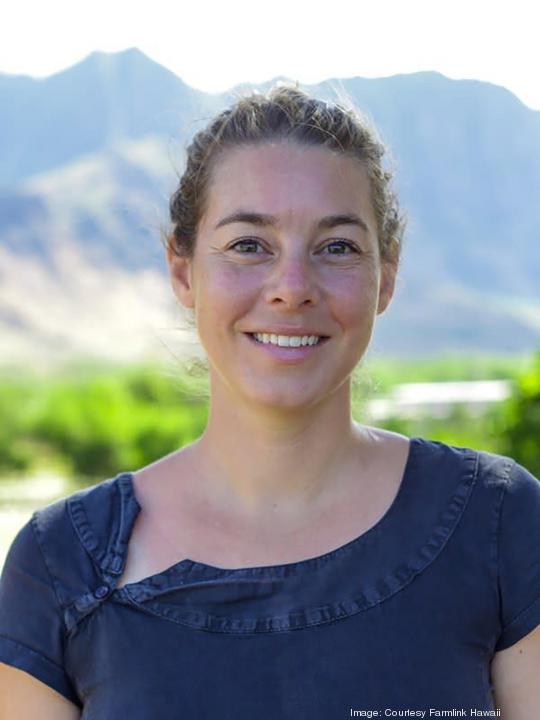
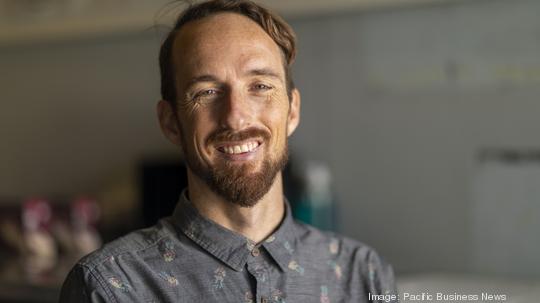
Founded by Rob Barreca in 2015, Farm Link Hawaii is a local agricultural e-commerce and food delivery business that has seen recent growth as a result of the pandemic and the demand created for locally grown food.
In September, the company — which is funded through a combination of earned income, grant funding, and founder funding — hired Claire Sullivan as its new CEO amid a 45% growth in positive sales. Barreca, who previously held the CEO position, shifted to a newly created position of chief technology officer for the company.
In Q4 of 2021, Farm Link Hawaii received $2 million in investments including $892,000 from Kamehameha Schools, a $200,000 bridge loan from Hawaii Investment Ready, a $750,000 commitment through the U.S. Department of Agriculture Local Food Promotion Program, and a $150,000 grant from a Hawaii-based family foundation, Barreca told PBN.
Barreca says that the company’s focus in 2022 is to expand the availability of its services. To that end, Farm Link now offers free islandwide home delivery to those paying with SNAP-EBT.
“It was a huge priority for our team to increase access to good food for all, but accepting SNAP-EBT online payment was still a ways off due to delays from the USDA,” Barreca said. “Eager to do something, our team launched a point-of-delivery solution built with in-house technology using Google Apps Scripts, Clover’s payments API, and Clover EBT devices on every delivery van.
“We hope to allow SNAP-EBT recipients to be able to pay online with their EBT card in the second half of 2022, but for now they can access good food with an automatic discount of 50% on all produce and get free home delivery islandwide,” he said. “This year, we’ll begin expanding outreach to other community organizations, like The Food Basket, to spread the word.”
As Farm Link Hawaii continues to grow, Barreca says he is optimistic about the future of the company.
“The pandemic has accelerated the existing local and national trend toward online grocery shopping and home delivery,” he said. “Here in Hawaii, this has been coupled with an increased awareness of and commitment to supporting local businesses and diversifying our economy. Happily, Farm Link is uniquely positioned to meet these converging demands, which we anticipate will translate into long-term growth.”
FARM ZERO
Agriculture
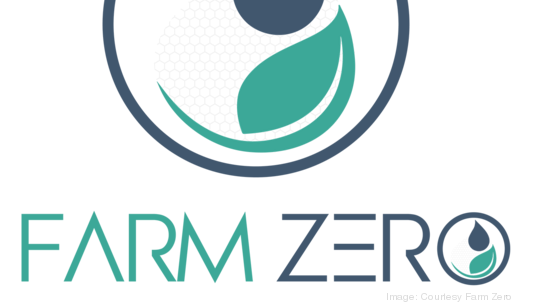
Farm Zero is a new agricultural tech company that specializes in climate-controlled vertical farming. Founded by Jo Ochs and Sheila Rosete in 2021, the company brings the concept of sustainable farming in the Islands to the next level with hydroponic vertical farms that are net zero in terms of energy, carbon, water and waste.
Farm Zero’s first two farming containers are being shipped to a site in Kailua where they will be retrofitted with solar, hydro and wind panels so they will be able to operate without being plugged into the grid. Ochs told PBN that the company hopes to have its first crop by this summer.
The company is currently working to obtain funding through the U.S. Department of Agriculture for startup costs, in addition to creating contracts with Hawaii schools, organizations and nonprofits looking to have access to hydroponic produce in their own backyards.
“So the concept is that we contract with an organization or individual and give them options that include 800 varieties of leafy greens, micro greens, and flowers and other produce to choose from,” Ochs said. “It’s really going to be customizable to the user. We put a container at the customer’s location, we operate it and supply the laborer that goes in 10-15 hours a week in the container, and then we grow the food and deliver it to the customer, ‘delivering’ being walking it out to the door to their location.”
Pricing per container, which can produce the equivalent of 2.5 acres of traditional farm land, will depend on the crop mix, but since the containers are climate-controlled, crops can grow year-round.
Ochs said a single container can grow approximately 4,000 heads of lettuce per month, providing a potential solution to Hawaii’s dearth of locally grown foods.
“During the pandemic, being so close to being food insecure in Hawaii was really scary,” Ochs said. “About 80% of our food is imported and worrying about that — in addition to our passion of sustainable farming — was the driving force in making Farm Zero a reality.”
Parklinq
Technology
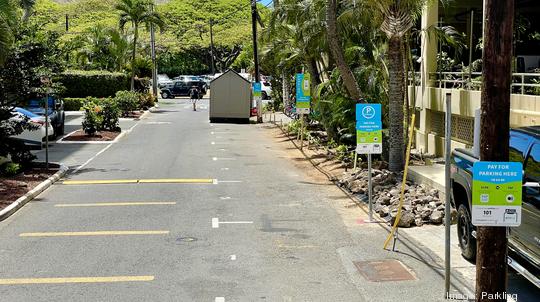
Parklinq was founded in 2020, born out of a frustration that many living and working in Honolulu face: parking.
Enter Parklinq, an app that connects people hunting for parking with stall owners.
Founder and product architect Tyler Saenz said in an email to PBN that revenue grew a staggering 982% from 2020 to 2021 and is on track to see another 510% revenue increase in 2022. The company now has more than 45,000 customers and partners in Hawaii.
In October, the startup expanded to Maui.
“The expansion to Maui has gone amazing!” Saenz said. “We’re currently servicing the parking for Maui Ocean Center, Pacific Whale Foundation and Maui Harbor Shops.
“Revenues generated in Maui are being used to fund an environmental project that will redirect stormwater runoff from the paved parking and reduce sediment and oil runoff to protect the coral reef in Maalaea Bay,” he continued.
The company is planning expansions for West Oahu, Hawaii Island and “two major tourist attractions on Oahu,” projected to cost $265,000, financed in-house, he added.
“As we continue furthering local partnerships, Parklinq has integrated parking as an add-on for ticketing and reservations companies in Hawaii,” Saenz said. “We’ve also started working with advanced automatic license plate systems to remove pain points from the parking experience and to replace legacy equipment with software.”
Hohonu
Science, technology
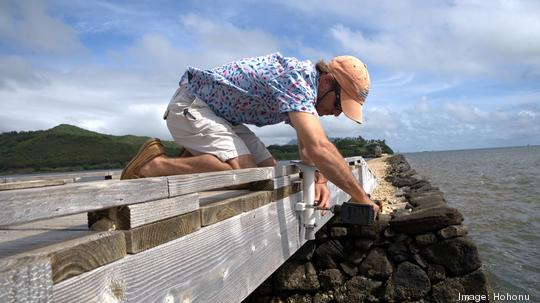
Hohonu, a Hawaii startup that uses its own sensors to help detect sea level rise, will take its technology to more coastal communities in 2022.
Co-founder and CEO Brian Glazer – an associate professor of oceanography at the University of Hawaii at Manoa who started the effort in his lab in 2014 – said in an email there is “huge public, governmental and commercial demand for technological solutions for intensifying climate change impacts, so we’re in a great spot.”
The company, which incorporated in 2019, was commissioned last year by a regional member of the National Oceanic and Atmospheric Administration, or NOAA, to assist communities along the Atlantic coast, PBN reported in October.
Glazer told PBN that the NOAA effort is going well and the company has delivered on the first part of the project, and has already deployed sensors in Florida, North Carolina and South Carolina, with plans to deploy more in Georgia.
Hohonu also expanded beyond that initial project and has other deployments with municipalities, towns, counties, nonprofits and other organizations in Delaware, Maryland, Massachusetts, California, Alaska and Hawaii, he said.
In 2022, the company will target eight priority states and aims to deploy 350 sensors.
In terms of financing, Glazer said in 2021, the company’s goal was to not raise investment money yet, start generating revenue and prove the business model successful.
Hohonu will expand upon that in the new year, he said, but Hohonu is “looking to hire and build out the team,” and a $1.5 million pre-seed round of funding will close in the next month.
“Last year was a new record for temperatures for oceans, so the planet and oceans are warming at unprecedented rates,” Glazer said. As depressing as some of the news is around climate change, “it’s still an exciting time to think about blending some of the advancements that are rolling out and applying those to earth, ocean and climate science.”
Ai.Fish
Technology
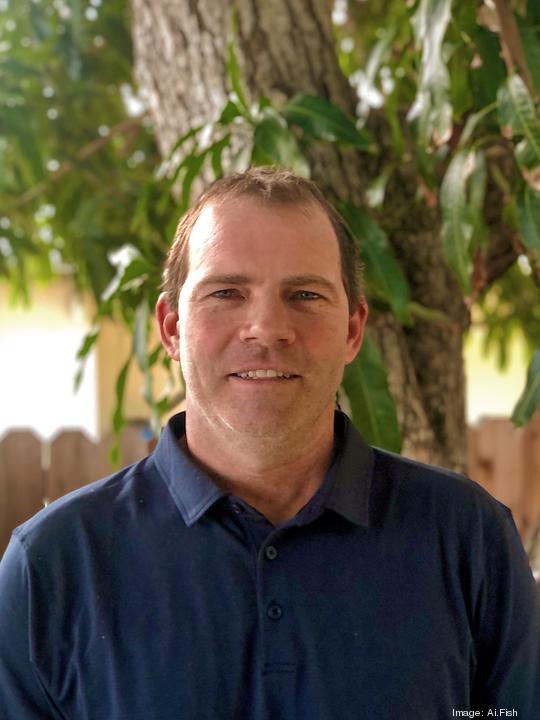

Ai.Fish is a software startup that utilizes artificial intelligence and machine learning to streamline electronic monitoring processes in the marine space.
Or, as CEO Jimmy Freese sometimes quips in explaining his work, “I tell people to think of us as glorified video editors that can go through terabytes and terabytes of data.”
Founded by Freese and Chief Technology Officer Justin Kay in 2019, Ai.Fish so far has focused much of its work on fish monitoring.
Freese explains that agencies such as the National Oceanic and Atmospheric Administration collect data from fishing activities to manage fisheries. That task, however, can be extremely time-consuming — it can take someone four or five days to watch and analyze videos from a three-week commercial fishing trip, he said. The Ai.Fish platform dramatically reduces those hours by using computer vision to monitor which types of fish were caught on a trip, the bycatch, and if there were any interactions with turtles, whales or other marine life.
“The goal is to create a platform in which … they would have an easy way of knowing what was going on with the catch on those boats,” Freese said.
A main motivator for starting Ai.Fish, he said, was to address issues in marine conservation and help prevent overfishing.
The company’s first grant was for electronic monitoring of videos of Hawaii longline fishing boats. Most recently, they were awarded a $250,000 grant from the National Fish and Wildlife Foundation to develop and deploy a cloud-based software system for processing electronic monitoring video data using machine learning in Alaska.
“The project will improve efficiency for data analysis in the Alaska fixed gear [electronic monitoring] program and will be able to be utilized in this and other programs across the United States upon completion,” Freese said. “It will also disseminate best practices for implementing machine learning in EM data review, and create a low-cost option for incorporating machine learning processing into other fisheries.”
In addition to grants, Ai.Fish also generates income through consulting and software development, primarily in computer vision.
Looking ahead, the pair aims to grow the company in both size and scope — they’re looking to hire a machine learning expert and a data scientist, and they are exploring ways to apply their technology in different sectors. Freese said they have been in talks with a range of other industries from national security to agriculture about their needs for computer vision.
“There are a lot of applications. … We see a vast, vast amount of opportunities in this area,” he said.
Zmana
Security, technology
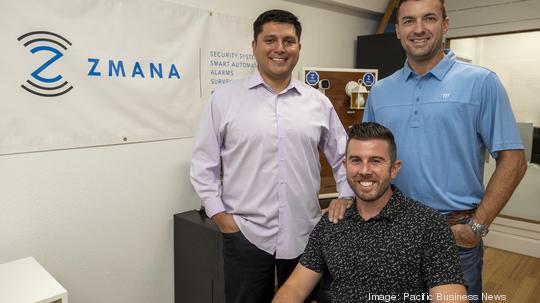
Since its launch in 2018, Honolulu-based security systems company Zmana has experienced a meteoric rise. It has expanded its customer base to include thousands of homeowners and businesses across Oahu, landing a spot as No. 2 on PBN’s list of Fastest Growing Companies for 2021, with a growth rate of 955% between 2018-2020.
Founder and CEO Kevin McCallum credits that growth in part to their use of technology. Zmana provides customized smart security solutions for residential and commercial properties — including security monitoring, access control, and smart home automation — and McCallum said that they’re always on the hunt for the best, most advanced technology to integrate into their products and services.
That remains one of the company’s primary goals for 2022, and they’re off to a strong start: Zmana has developed two new products it plans to introduce this year.
While McCallum can’t reveal too much yet, he said the first product — which they’re in the process of rolling out — is designed to monitor properties with real-time visual assessment and human engagement. For the second product, McCallum shared just this intriguing descriptor: “You know when you order from Amazon and the package sits on your front porch? I’ve solved that problem.”
“We’re going to continue to try and find the most innovative technology to make all of our lives safer and easier,” he said.
But the thing McCallum said he is most excited about in 2022 is a new charitable venture: Zmana is creating an innovation and technology scholarship program for students at University of Hawaii – West Oahu.
“We are so excited about the industry that we want to get younger kids to be involved,” he said. They have not yet set a dollar amount for the scholarship, but he said it’s slated to launch sometime in the first quarter.
When it comes to revenue, McCallum said they’re aiming to grow by at least 50% this year, but the company’s most important goal is simply “making sure that our customers are taken care of.”
“Any time someone has an issue — Friday night, Saturday morning, doesn’t matter — we’re taking care of them. That service is the key for us.”






